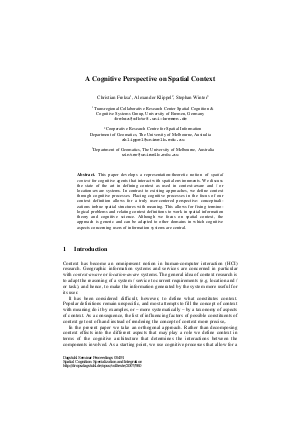A Cognitive Perspective on Spatial Context
Authors Christian Freksa, Alexander Klippel, Stephan Winter
-
Part of:
Volume:
Dagstuhl Seminar Proceedings, Volume 5491
Part of: Series: Dagstuhl Seminar Proceedings (DagSemProc) - License:
 Creative Commons Attribution 4.0 International license
Creative Commons Attribution 4.0 International license
- Publication Date: 2007-04-25
File

PDF
DagSemProc.05491.4.pdf
- Filesize: 0.5 MB
- 16 pages
Document Identifiers
Subject Classification
Keywords
- Representation theory
- spatial context
- location aware systems
Metrics
- Access Statistics
-
Total Accesses (updated on a weekly basis)
0Document
0Metadata
Abstract
This paper develops a representation-theoretic notion of spatial context for cognitive agents interacting with spatial environments. We discuss the current state of the art in defining context as used in context-aware and/or location- aware systems. In contrast to existing approaches, we define context through cognitive processes. The term "invisible geography" alludes to the fact that knowledge about geographic space develops through complex cognitive interaction and is not simply "out there" to be looked at. Placing (cognitive) processes in the focus of our context definition allows for a truly user-centered perspective: conceptualizations imbue spatial structures with meaning. This allows for fixing terminological problems and relating context definitions to work in spatial information theory and cognitive science. Although we focus on spatial context, the approach is generic and can be adapted to other domains in which cognitive aspects concerning users of information systems are central.
Cite As Get BibTex
Christian Freksa, Alexander Klippel, and Stephan Winter. A Cognitive Perspective on Spatial Context. In Spatial Cognition: Specialization and Integration. Dagstuhl Seminar Proceedings, Volume 5491, pp. 1-16, Schloss Dagstuhl – Leibniz-Zentrum für Informatik (2007)
https://doi.org/10.4230/DagSemProc.05491.4
BibTex
@InProceedings{freksa_et_al:DagSemProc.05491.4,
author = {Freksa, Christian and Klippel, Alexander and Winter, Stephan},
title = {{A Cognitive Perspective on Spatial Context}},
booktitle = {Spatial Cognition: Specialization and Integration},
pages = {1--16},
series = {Dagstuhl Seminar Proceedings (DagSemProc)},
ISSN = {1862-4405},
year = {2007},
volume = {5491},
editor = {Anthony G. Cohn and Christian Freksa and Bernhard Nebel},
publisher = {Schloss Dagstuhl -- Leibniz-Zentrum f{\"u}r Informatik},
address = {Dagstuhl, Germany},
URL = {https://drops.dagstuhl.de/entities/document/10.4230/DagSemProc.05491.4},
URN = {urn:nbn:de:0030-drops-9804},
doi = {10.4230/DagSemProc.05491.4},
annote = {Keywords: Representation theory, spatial context, location aware systems}
}
